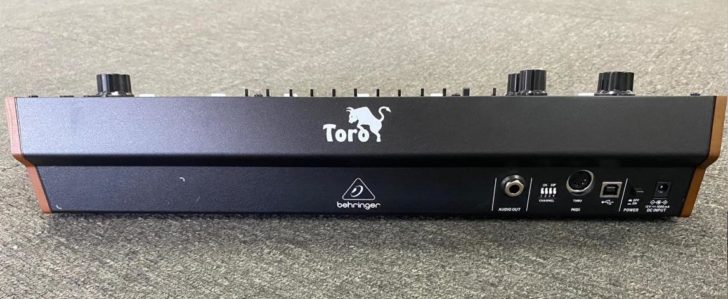
Behringer today introduced the Toro, a new bass synthesizer that they describe as “an authentic recreation of the legendary Moog Taurus Revision 1”, but without the foot pedals.
In addition to copying the Taurus design, the new Behringer synth uses a knockoff name and logo.
The Toro is scaled down to fit into Eurorack format and can be removed from its case for rackmounting as part of a larger system.
The synth is a dual-VCO VCF VCA design, with envelopes for filter cutoff and volume. The synth also features four preset sounds (Tuba, Bass, ‘Toro’ and Variable), like the original.
Features:
- Classic Analog Bass Synthesizer with 2 VCOs, Ladder Filter and Presets in Eurorack format
- Recreates the circuit design of the Taurus I bass synth
- Analog signal path
- 2 VCOs
- 5-octave range
- VCO A and B mix fader for full control of the internal balance
- Classic low-pass ladder filter with Cut-off and Emphasis controls
- Envelopes for filter cut-off and amplitude
- 4 ‘magic-sound’ presets: Toro, Tuba, Bass and Variable Glide, featuring Amount slider and a dedicated On/Off button
- Large Filter cutoff and Volume knobs
- CV, Filter cutoff and Gate inputs for external control
- 16-unit Poly Chain allows combining multiple synthesizers for up to 32 voice polyphony
- Eurorack format
- 23 controls give real-time access to key parameters
- MIDI implementation with MIDI channel and Voice Priority selection
Behringer has not shared any audio demos at the time. Here’s an example of an original Moog Taurus 1 in action:
Pricing and Availability
Behringer says that the Toro synthesizer is fully developed, but production is waiting on chip availability. The price that they are targeting is $199 USD.



Nice! I’m mostly shocked that no other company took this opportunity sooner.
Moog did, with the Minitaur.
How is the Minitaur Eurorack compatible? Would love to see one mounted in a eurorack though
idk, the eurorack compatible pitch cv, filter cv, vca cv in etc?
mods are available for racking it, but dont really get the point, why waste space in your rack and power of your psu on something that already has a perfectly specced psu built in?
Do you have to use the word ‘knock off’ in every single Behringer related post? It’s getting boring now…..
Yep. I agree.
Somebody is either thin skinned or not very observant.
See Xtfw’s comment!
No, we only use it when a product is a knockoff.
Maybe using “homage” would be less upsetting to the Behringer fans
Our job is not to avoid upsetting a few readers, it’s to provide accurate and factual coverage of news that intererests electronic musicians.
hilarious reading of one side of room.
enjoy your clicks.
Thanks for sharing your feedback!
Indeed! What I particularly like about this knockoff that it is not just ‘inspired’ by, but it is indistinguishable from the original. A true knockoff!
Literally the first time in 8 Behringer posts the word knock off is used lol, every single b3hrin3r post? Let’s be real, this is a knock off.
What are you trying to prove continuesly using the term knockoff regarding behringer?
It just stinks of bad blood and childish behaviour .
Syntopia.com the knockoff website grow up.
What’s childish about the truth? It is a knock off. You can be ok with that, but it doesn’t make it less true. Whining about how a website reports on some luxury good, now that’s whiny and childish.
It’s not a knockoff when someone other than Behringer does it
Synthtopia often labels knockoffs from smaller less well known companies as “clones”
You can find this literally all over the site
The System80 808 comes to mind
https://www.synthtopia.com/content/2018/09/09/system80-880-eurorack-tr-808-clone-now-available-to-pre-order/
So you’re admitting that the ‘Toro’ is a knockoff, and you are saying that you are butthurt because Synthtopia doesn’t call all types of copies ‘knockoffs’.
Maybe you should talk to the manager about this.
Repeatedly using the term does seem like a derogatory slight against the Behringer company.
“Repeatedly using the term does seem like a derogatory slight against the Behringer company.”
Maybe if you’re a snowflake – but no rational person should disagree with the statement that “The Toro is a cheap knockoff of the Taurus. “
Not really, just the facts. Personally don’t even mind knock offs, what I mind is a company that actively steals designs from products that aren’t old and still available, sueing forum members over opinions posted, harassing and literally trademarking a reporters name while trying to publically humiliate them, poor working conditions in factories, etc etc.
Behhh doesn’t deserve your simping.
We’ve covered this many times, but I’ll repeat it for clarity:
If a product is designed and marketed as an inexpensive copy of another company’s product, and it doesn’t infringe on any intellectual property, it’s a knockoff.
Knockoffs often use ‘copycat’ look and naming, to make it obvious what they are copying. An example would be ‘Toro’, being a copy of ‘Taurus’. Knockoffs also often have random changes to the look to avoid copying the original too closely, like the RD-8 design and D swapping colors of buttons around. Knockoffs generally have obvious compromises to the design to make it cheaper to manufacturer, like Behringer eliminating panel washers on their Euro modules or cutting an octave off of their keyboard to make instruments smaller.
Clones are functionally equivalent to the original, and shouldn’t have obvious design compromises to make them cheaper to manufacturer. An example is the SynthWerk versions of classic Moog modules.
Reissues are when a company re-releases their own design with minor enhancements. These are often obsessive-compulsive remakes and expensive. Examples would be the Moog Modulars, the Moog Model D, the Sequential Prophet-5 and the Korg ARP 2600.
Replicas are exact copies of the original. This is very rare, but Din Sync makes some circuit boards that are 1 to 1 replacements for x0x original gear, so you can fix an old TB-303 for example.
Other designs are ‘inspired by’ when it’s clear that they build on previous work, but aren’t designed and marketed as copies of specific designs. Examples would be the Korg Volca Modular and Volca FM, all the Euro modules that copy parts of older gear, etc.
Behringer gear frequently gets categorized as ‘knockoffs’ simply because that is the company’s business model. It’s kind of ridiculous that we have to explain this when Behringer is very intentionally copying an entire line of Moog’s gear, they say that’s what they are doing, and they say their business model is to make cheap copies of other companies designs.
If facts bother you, that’s on you.
Synthtopia is a knockoff of Matrixsynth.
Seems like the definition of a knock off to me. Maybe a knock off is just the thing for you: the sound you want with build quality that that is satisfactory to you in this age of disposable technology. No moral judgment here, but this clearly isn’t a replica or clone.
Behringer has announced approximately 3872 synthesizers in the last week and we should start a betting pool to see if any of them actually ever ship.
Sincerely,
Still Waiting on the Edge
The entire electronics world is experiencing chip shortages and supply chain interruptions
You can’t even get a PlayStation 5 from one of the biggest and best known manufacturers on the planet almost 18 months after it had been initially released
If you haven’t noticed this and have wilfully neglected the number of synths Behringer had released prior to the pandemic, and say compare this number to that of any other synth manufacturer – well then you might as well have been living under a rock
Would have been great to be able to have the pedals as an optional extra., perhaps connected by a cable so you don’t have to keep bending down to change settings.
They’d sell 50 of these for every person that wants pedals, though.
Got the real thing here since 1980.. still good. And it’s got pedals..
Here in Norway the local maker of dried soup (add water) is called Toro.
Has anyone made a MIDI pedal rig with velocity?– and I’m not talking about those little squishy buttons by Keith M.
Is the Behri Bull supposed to be jumping or humping?
This is what I thought too, bad design.
It does look like it’s humping the ‘o’ in ‘Toro’.
I took that as a Behringer ‘f*** you’ to Moog.
nah man
A picture of the beta breadboard will be on-site for naysayers in 2024, hardware projected as deliverable by 2049.
In a few years, no one will know about the Moog company.
Sorry, but it is.
Chicken brain welcomes you.
Sorry, but that’s the stupidest comment in of a thread that’s already bursting with stupid comments.
Moog is selling as many $8,000 Moog One synths as they can build, they’ve got three must-own Eurorack synths, their keyboards are standard gear for many types of musicians and they also make one of the most technically advanced and creative software synths available.
But you think they’re going to go out of business because Behringer is making a cheap knockoff of a design from 40 years ago?
LMFAO
Moog still sells lotteries and signatures, famous names,
they no longer have experts, engineers, technology, testing team, factory…
what is happening with Moog is very similar to Bydem’s Dement…
Sorry, this is an inevitable case when insanity takes over the state, everything falls apart…
My father David Luce (“Dr. Dave”) designed the Taurus Pedals for Moog Music Inc back in the early 1970s. It has a whole series of innovative and unique electronic features that enabled its great sound and tuning stability. I’ll be publishing a biography sometime soon that will describe how he came to do all that. I was with him at a Genesis show in Rochester NY where he got to see them used in a big way for the first time.
Fantastic Ben, what a great story to tell. Thx for posting mate, looking forward to the bio!
It’s better than the old price of shit .
Pity you can’t have the option of a set of pedals connected by a long lead so you don’t have to keep bending down to change settings.
What’s the point without the pedals?